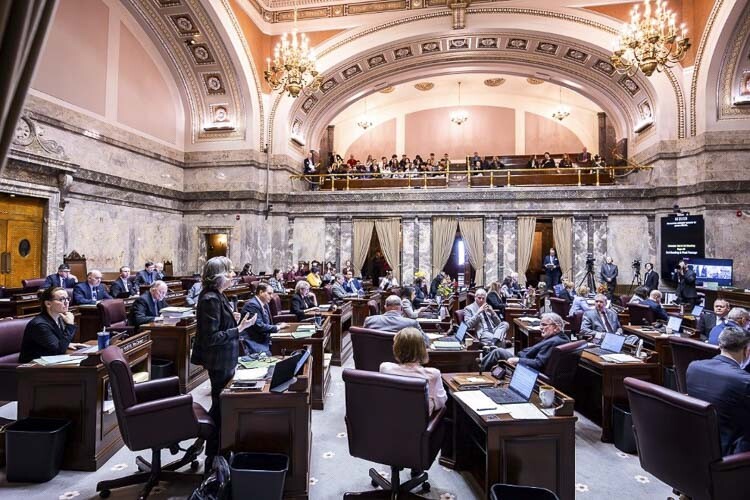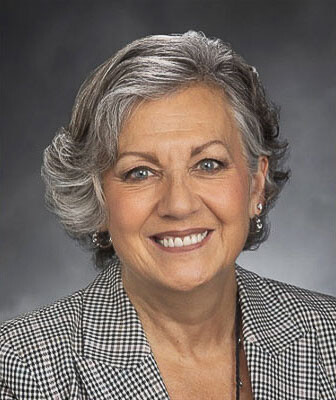
Vancouver Republican cites leadership on budget, passage of Tiffany Hill Act as highlights
Sen. Lynda Wilson announced today (March 6) that she will not seek another term in the Legislature.
Wilson, R-Vancouver, was elected to the Senate in 2016 after a term in the House of Representatives. She won a second term in 2020 but will not be a candidate for the 17th District seat later this year.

“It’s been such an honor to serve the people of our beloved state, particularly my neighbors in southwest Washington,” said Wilson, “but I am looking forward to having more time to be a mother, grandmother and small-business owner, as I was a decade ago.
“We had one grandchild when I ran for office the first time, now we have six. I’m coming up on being cancer-free for five years. We have a family business that is transitioning into the third generation and I want to be more involved in the process. This week I voted to pass three good voter initiatives into law. Part of me doesn’t want to go, because there are more things needing to be done, but the other part knows it’s a good time to step away.”
While Wilson’s business background was a factor in her decision to seek election to the House, it didn’t take long – especially after she became a senator – for her to become known as a staunch defender of law enforcement, veterans, the Second Amendment and shooting sports, resulting in numerous “legislator of the year” honors and being welcomed into the Hunters Heritage Hall of Fame this year.
Throughout her tenure as a lawmaker, she consistently championed tax relief and demonstrated a steadfast commitment to government accountability – including a multi-year effort during and after the pandemic to limit the governor’s powers and expand the legislative branch’s oversight authority during a state of emergency.
Her leadership on the state operating budget included two years of dealing with pandemic-related appropriations, followed by two more years of working to control spending in anticipation of a slowing state economy. That led to strong bipartisan support in the Senate for the budget adopted in 2023 and the reflection of Republican priorities in the supplemental budget this year.
Out of the many bills she sponsored that have become law, Wilson points to four as highlights.
Her 2019 legislation to legalize pink as hunter-safety clothing reflected her love of hunting and her recent breast-cancer diagnosis. After undergoing cancer treatment during that year’s legislative session she became an even stronger advocate for cancer-related policies, leading to the passage of her breast-cancer screening bill in 2023 and advocating for biomarker testing. She has secured millions of dollars in funding for cancer research and support services.
The 2020 repeal of the sales tax on feminine-hygiene products reflects Wilson’s efforts on tax relief, while her priority on public safety led to the Tiffany Hill Act, a law aimed at protecting domestic-violence victims from their abusers. After a Vancouver mother and former Marine named Tiffany Hill was murdered by her estranged husband in November 2019, Wilson worked tirelessly with others in Clark County to get the proposal passed.
This session she has been out front on the Senate’s efforts to deal with the fentanyl crisis, and is hopeful that her “One Pill Kills” legislation (SB 5906) will reach the governor’s desk after being passed in the Senate and House.
After the Legislature adjourns tomorrow, Wilson says she will meet with residents of her district to report on the session, then focus this summer and fall on raising awareness about the three voter initiatives that were not passed by the Legislature, placing them on the November general-election ballot.
“My experience as a legislator has been fulfilling, educational, trying, and humbling, all at the same time,” she said. “But I’m not done. I’ve made this decision but will keep going full-tilt until it’s time to hand off to someone else… and you never know after that.”
Also read:
- Letter: ‘We’re going to give them some money and a plane ticket, and then we’re going to work with them’Camas resident Anna Miller supports a new structured self-deportation policy, calling it a balanced approach to immigration and economic needs.
- Pro-Palestinian protesters occupy UW building, 30 arrestedAbout 30 protesters were arrested at the University of Washington after occupying a building and demanding the school cut ties with Boeing.
- Sen. Braun praises UW officials for response to Monday protests, calls for prosecutionsSen. John Braun praised UW officials for their firm response to violent protests tied to the university’s relationship with Boeing.
- Largest parade in Southwest Washington bands together for a better tomorrowThe 59th annual Parade of Bands in Hazel Dell will feature 24 high school bands and more than 120 entries on May 17.
- Don’t leave tax dollars on the table; learn about county’s tax exemption program at May 16 event in WashougalClark County tax exemption specialists will assist seniors and people with disabilities during a May 16 event in Washougal.
- Trades Tuesday is here, hoping to become a trend in area schoolsA new campaign is launching in area schools to inspire students to consider careers in the trades.
- Opinion: What the 2025 legislature tells us about why Washington’s government keeps failingTodd Myers of the Washington Policy Center argues that Washington’s government fails because it resists humility, experimentation, and accountability in its policymaking.












Senator Lynda Wilson has consistently questioned the push to add light rail to the I-5 bridge, against the votes of Clark County residents. Her insight as a business owner on moving freight in the region in a cost effective manner will be sorely missed. Wilson has been vigilant about cutting unnecessary state spending, as business owners, mothers and grandmothers all over WA must cut spending to to face escalating inflation.
In November 2012: -Clark County voters REJECTED the C-Tran ballot proposition to raise the sales tax to extend Oregon’s TriMet Max light rail into Clark County. Every city in Clark County rejected the CTRAN Proposition, as did limited county area permitted to vote.
In November 2013, Clark County Councilors placed an advisory vote on the ballot to oppose any Light Rail project in Clark County unless it is first supported by a majority of the voters in a county-wide advisory vote of the people. Over 68% of voters approved the measure. No county-wide advisory vote on light rail has been held since then.
Today, the Interstate Bridge Replacement (IBR) group insists that Clark County, WA must accept Oregon’s costly MAX light rail on any I-5 replacement bridge, and the planned tolls to pay for the added BILLIONS that choice would cost. However, light rail is not required on a replacement bridge or tunnel at all. Transit such as buses and vans that serve the region now are more flexible in vehicle size and route, at a fraction of the cost of light rail. Plus, a lane used by buses and vans can share the road with other bridge users.
Our region needs a third bridge on the west side to facilitate freight movement between the Ports of Vancouver and Portland and delivery of goods and services west of the downtown areas. We also need fiscally responsible local, state, and federal representatives who recognize that we could build 2 bridges, (or a tunnel and a bridge) for the price of the proposed $6-10 BILLION I-5 replacement bridge with gold plated light rail for the few who use transit to travel between WA and OR. Charging high tolls that take nearly half of the toll to pay to the tolling company is a complete waste.
Paul Harris is staking out his territory.